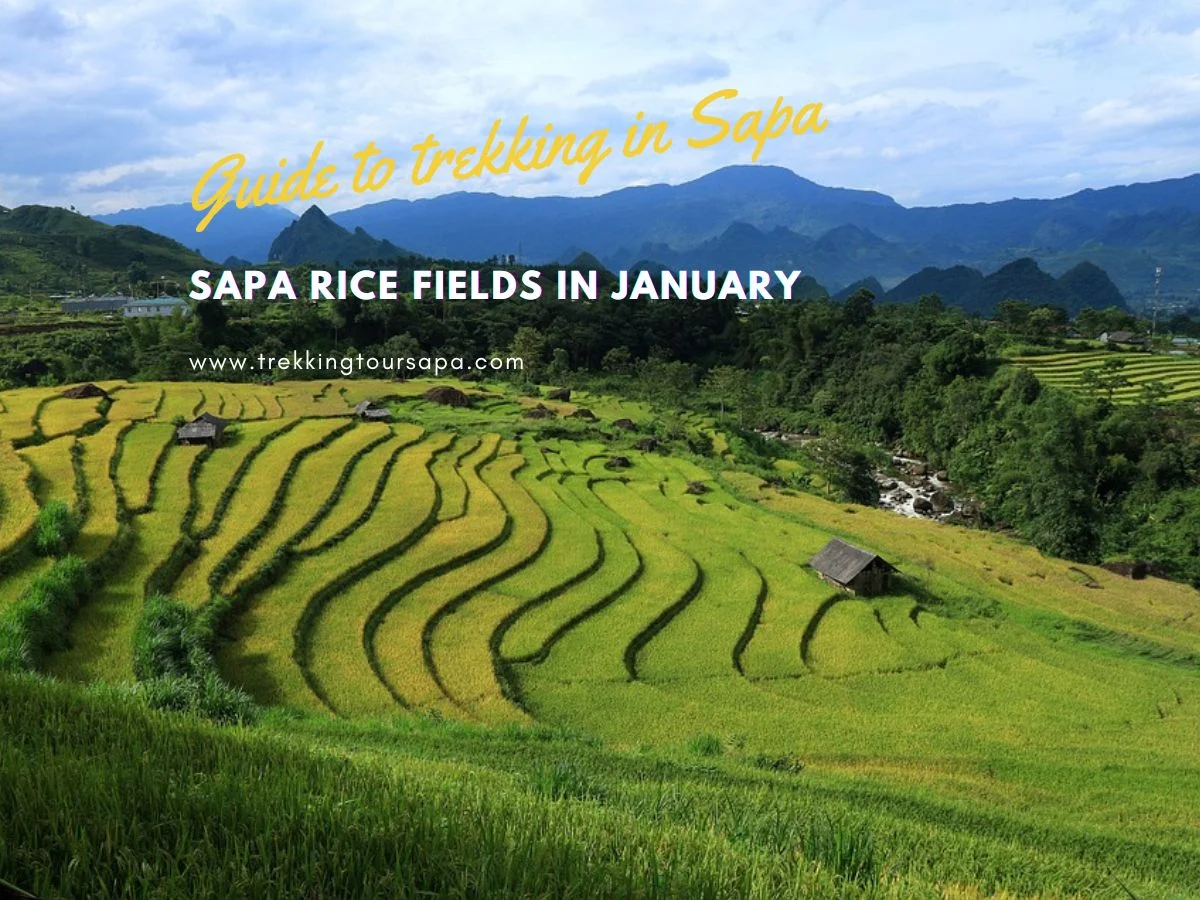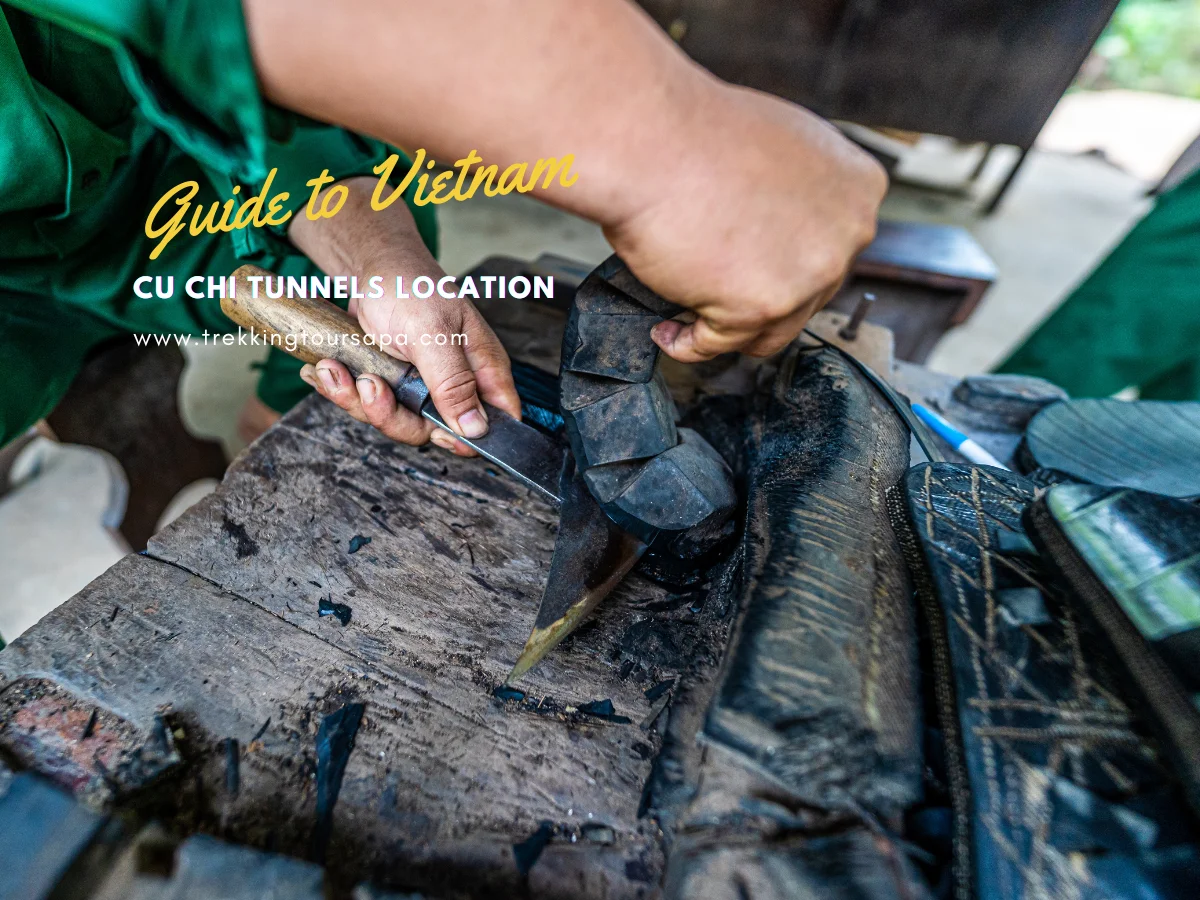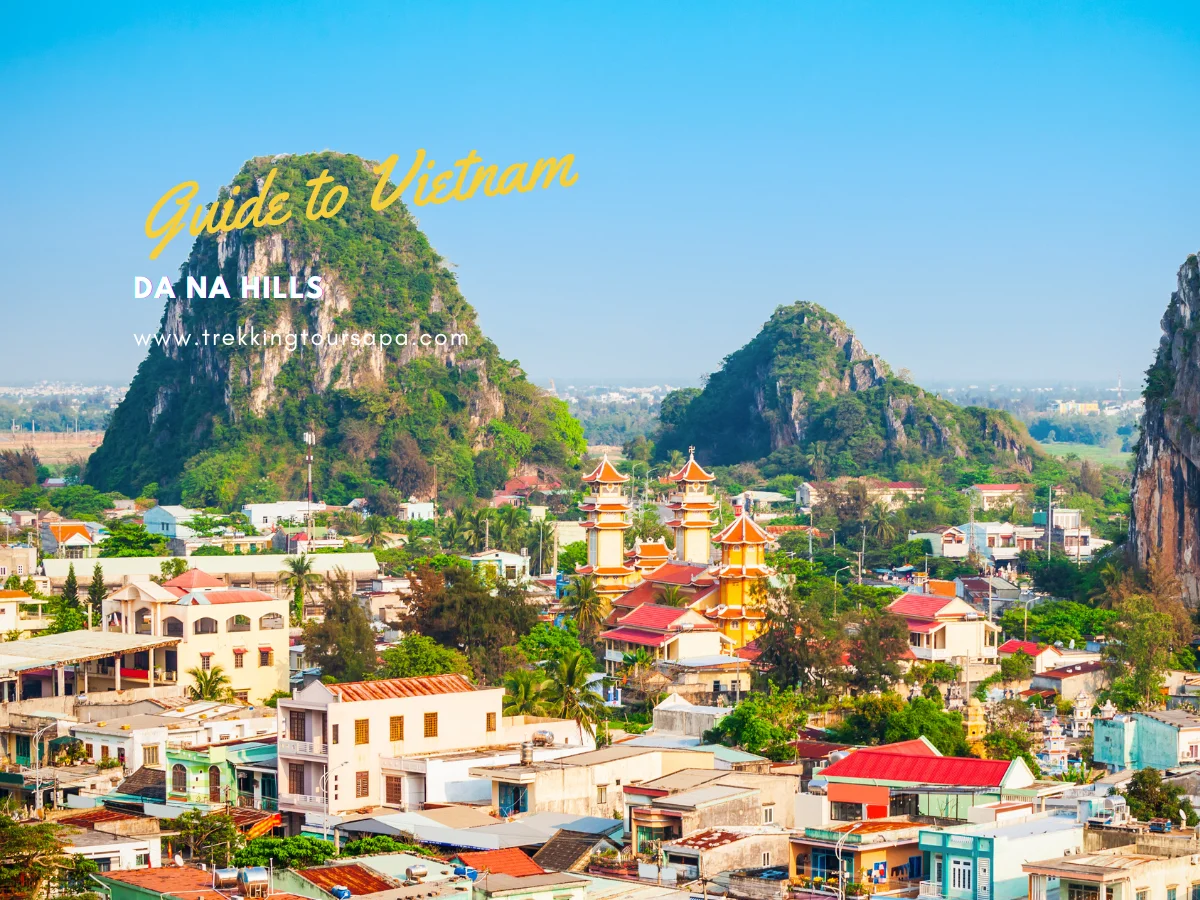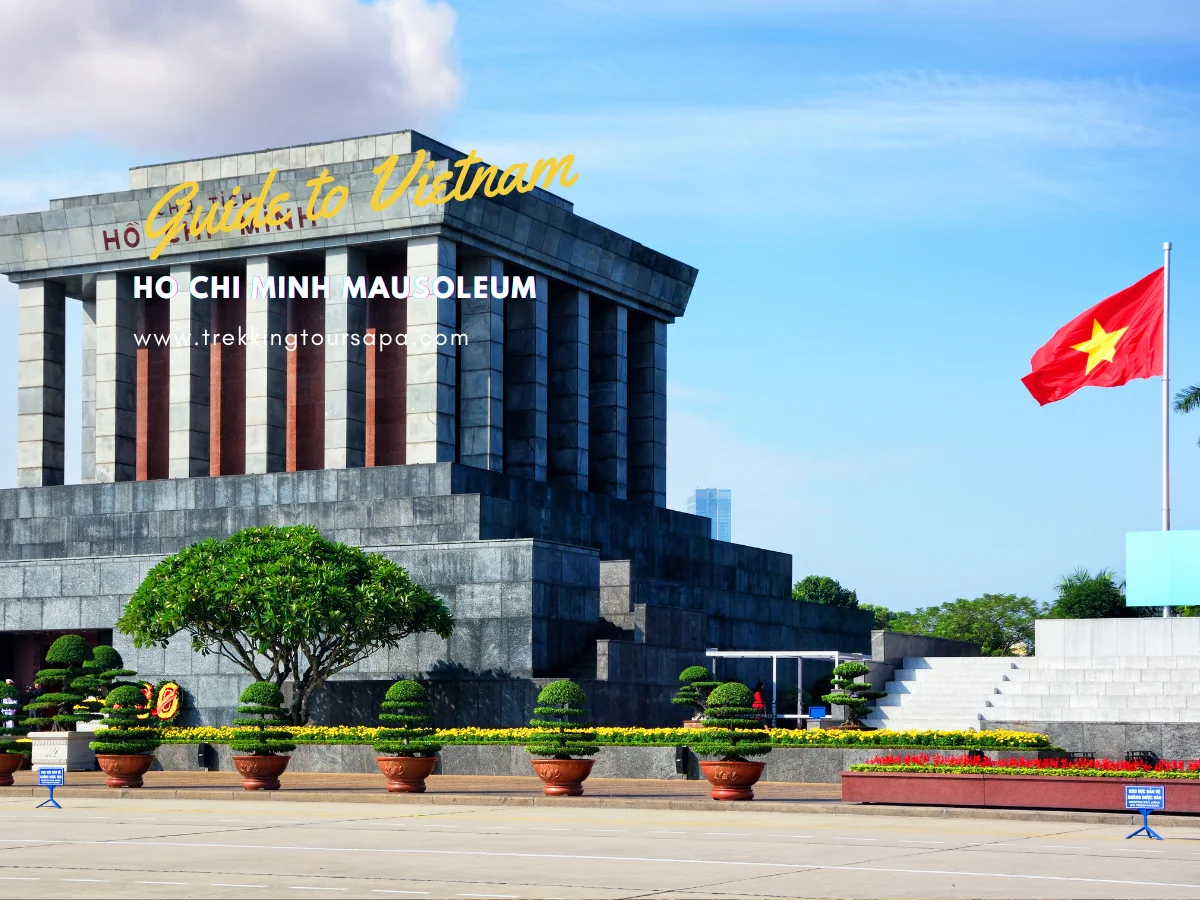Are you looking for an escape from the hustle and bustle of city life? Look no further than the Sapa rice fields in January. Located in northern Vietnam, these stunning terraced rice fields are a sight to behold during this time of year.

As you make your way through the winding paths of Sapa, you’ll be greeted by breathtaking views of vibrant green rice paddies cascading down mountainsides. The cool weather in January adds to the serene atmosphere, allowing you to fully immerse yourself in the beauty of nature. But it’s not just about the scenery – Sapa’s rich history and culture also add to its allure. So pack your bags and get ready for an unforgettable adventure in one of Vietnam’s most picturesque destinations.
Table of Contents
ToggleLocation and Overview of Sapa Rice Fields
Now you’re in for a real treat as we take a closer look at the stunning location and breathtaking overview of the Sapa rice fields. Situated in the northwest region of Vietnam, Sapa is a town that boasts not only majestic mountains but also an extensive system of terraced rice fields. These rice fields have been cultivated by local communities for generations and have become one of the most beloved tourist attractions in the country.

Despite being located in a remote area, the Sapa rice fields are easily accessible to visitors. You can get there by taking a train from Hanoi to Lao Cai or by bus from Sapa town center. Once you arrive, you’ll be greeted with panoramic views of endless green layers cascading down the hillsides. What’s more impressive is that this picturesque landscape was created solely through manual labor, using simple tools and techniques passed down from ancestors. The locals’ involvement in maintaining these rice fields has not only preserved their cultural heritage but also helped sustain their livelihoods. It’s truly remarkable how something so simple yet profound can have such an impact on both nature and people’s lives.
As you gaze upon this natural wonder, it’s hard not to be swept away by its sheer beauty and tranquility. But beyond its physical appearance lies an even deeper connection to our desire for freedom – freedom from our urban lives, from technology, from material possessions – reminding us that sometimes simplicity is all we need to find happiness. So let’s delve further into why January is one of the best times to witness this magical place!
Sapa 1 Day Tours
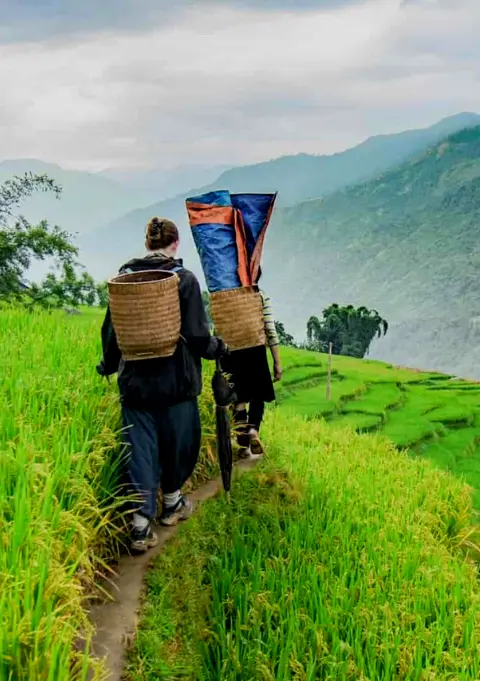
- 1 day experience
- Moderate to challenging
- Cultural immersion & active adventure
- Rice fields, valleys & villages
- Private tours
- Vegan-friendly
Sapa 2 Day Tours
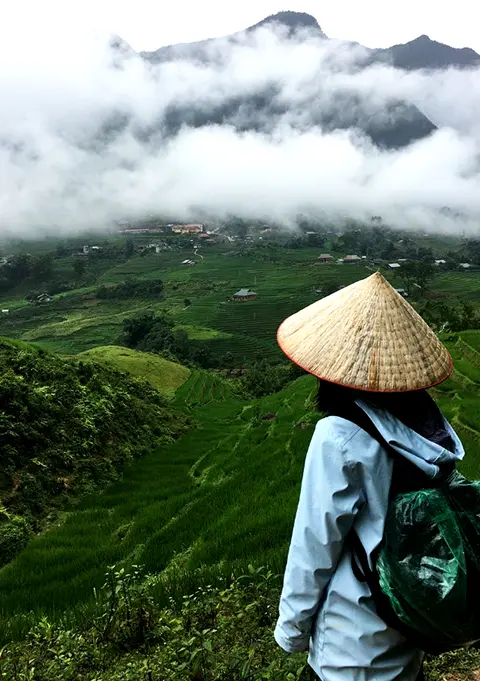
- 2 days 1 night experience
- Moderate to challenging
- Cultural immersion & active adventure
- Mountains, valleys, rice fields and villages
- Private tours
- Vegan-friendly
Sapa 3 Day Tours
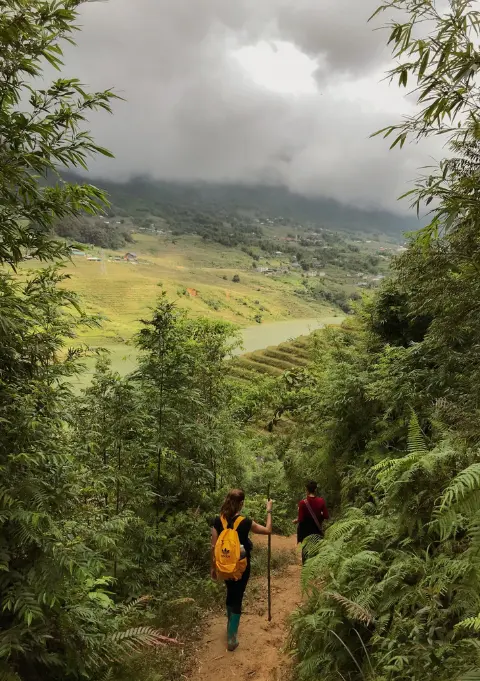
- 3 days 2 night experience
- Moderate to challenging
- Cultural immersion & active adventure
- Mountains, valley, rice fields & villages
- Private tours
- Vegan-friendly
Sapa 4 Day Tours
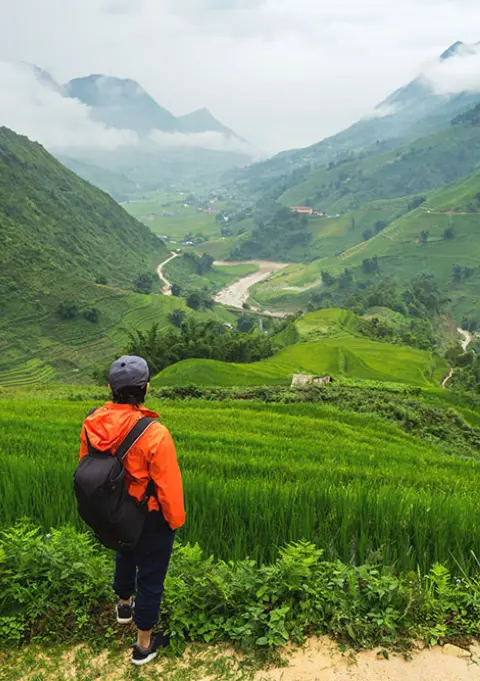
- 4 days 3 night experience
- Moderate to challenging
- Cultural immersion & active adventure
- Mountains, valleys, rice fields & villages
- Private tours – Less Touristic
- Vegan-friendly
The Beauty of Sapa Rice Fields in January
You’re in for a treat if you visit the Sapa Rice Fields in January. The reflections of the sky and surrounding mountains on the flooded terraces create a mystical atmosphere that’s hard to resist. As you walk through the sea of green and blue, you’ll find yourself mesmerized by the beauty of this natural wonderland – it’s no surprise that many photographers flock here to capture its magic.
Reflections of Sky and Surrounding Mountains
As you gaze upon the breathtaking view, the mountains and sky seem to blend seamlessly, creating a serene and harmonious atmosphere. The reflections of the sky on the rice paddies are truly mesmerizing. How it merges with the surrounding mountains creates a beautiful contrast between blue and green hues. It’s as if nature herself is painting a masterpiece before your very eyes.

The mountain vistas are equally impressive, towering over the sea of green and blue below. They command attention with their jagged peaks rising high into the sky, yet also provide a sense of calmness that can only be found in nature. As you take it all in, you can’t help but feel a deep connection to this land and its people. And just like that, you find yourself lost in thought, contemplating life’s mysteries amidst this magical scene.
Sea of Green and Blue
You’ll be amazed by the vast expanse of green and blue that stretches out before you as you take in the view of the Sapa rice fields in January. From an aerial perspective, the lush fields appear like a sea of green that seamlessly merges with the clear blue sky. It’s a breathtaking sight to behold, especially when contrasted with the surrounding mountains.

The green and blue hues of this landscape are truly mesmerizing. The vibrant shades of green signify new life and growth, while the deep blue color represents freedom and possibility. There’s something about this view that awakens a sense of exploration within you, urging you to go beyond what lies ahead and discover new horizons. As you gaze upon this stunning vista, it’s easy to feel uplifted by its beauty and inspired by its limitless potential. And just when you think things can’t get any more magical, an alluring mist begins to rise from the fields, creating a mystical atmosphere that draws you further into your journey without even realizing it.
Mystical Atmosphere
Step into a world of enchantment as the misty atmosphere surrounds you, beckoning you further into your adventure. You can feel the mystical traditions and spiritual practices that have been passed down for generations in these rice fields. The fog creates an ethereal aura that shrouds everything in a mystery, making you feel like you’ve entered another dimension.

As you walk through the Sapa rice fields in January, take a deep breath and let yourself immerse in this magical experience. The peacefulness of the surroundings will transport you to a place where time seems to stand still. This is not just an ordinary trip; it’s a journey that will awaken your senses and make you appreciate nature more than ever before.
Now, as we move forward to talk about photography opportunities, remember that every moment captured in these rice paddies tells a story.
Photography Opportunities
Get lost in the enchanting misty atmosphere of Sapa rice fields in January and capture the otherworldly essence of this mystical land through your camera lens. As you walk along the terraced fields, you’ll be amazed by the breathtaking scenery that surrounds you. The foggy backdrop creates a perfect contrast to the vibrant green fields, making it an ideal setting for landscape photography.

To make the most out of your photo shoot, try experimenting with different photography techniques such as long exposure shots or using a polarizing filter to enhance colors. If you’re not sure about which equipment to use, I recommend bringing a wide-angle lens and a tripod for stability. Remember to pay attention to details like composition and lighting, as they can make all the difference in taking stunning photos.
As you capture these mesmerizing moments through your lens, keep in mind that Sapa rice fields have been an important part of Vietnamese culture for centuries. Their history and culture are just as captivating as their scenic beauty.
History and Culture of Sapa Rice Fields
The rich cultural heritage of this region can be traced back centuries ago, with the Sapa rice fields serving as a living testament to the resilience and ingenuity of the local communities. The ethnic minority communities in this area have honed their rice terrace techniques over generations, creating a sustainable agricultural system that has allowed them to thrive in these mountainous landscapes.

Nested bullet point list:
- Their terracing techniques are based on centuries-old knowledge passed down from generation to generation, allowing for efficient use of land and water resources.
- This method involves carving out terraces into steep hillsides, which prevent soil erosion and retain moisture levels that are crucial for growing rice.
- These practices have also given rise to unique customs and traditions surrounding rice cultivation and harvesting, forming a part of the identity of these communities.
With such a rich cultural backdrop, exploring the Sapa rice fields can offer you more than just scenic views; it allows you to delve deeper into the history and traditions of this region. So let’s explore some best ways to experience the magic of these fields firsthand.
Sapa 1 Day Tours

- 1 day experience
- Moderate to challenging
- Cultural immersion & active adventure
- Rice fields, valleys & villages
- Private tours
- Vegan-friendly
Sapa 2 Day Tours

- 2 days 1 night experience
- Moderate to challenging
- Cultural immersion & active adventure
- Mountains, valleys, rice fields and villages
- Private tours
- Vegan-friendly
Sapa 3 Day Tours

- 3 days 2 night experience
- Moderate to challenging
- Cultural immersion & active adventure
- Mountains, valley, rice fields & villages
- Private tours
- Vegan-friendly
Sapa 4 Day Tours

- 4 days 3 night experience
- Moderate to challenging
- Cultural immersion & active adventure
- Mountains, valleys, rice fields & villages
- Private tours – Less Touristic
- Vegan-friendly
Best Ways to Explore Sapa Rice Fields
If you’re looking for unique and memorable ways to experience the vibrant culture and stunning beauty of this mountainous region, here are some top recommendations for exploring the Sapa rice fields. One of the best ways to immerse yourself in the local way of life is by taking a hike through the various trails that wind through the rice terraces. With each step, you’ll be rewarded with breathtaking views of cascading rice paddies and traditional Hmong villages nestled among rolling hills.

To truly make the most out of your adventure, consider hiring a local guide who can offer insights into the customs and traditions of these indigenous communities. Not only will they provide invaluable knowledge about their way of life, but they can also help navigate any language barriers or cultural misunderstandings that may arise during your visit. By partnering with a guide, you’ll have an opportunity to witness first-hand how these communities have adapted to modern times while still holding onto their rich heritage. As you plan your trip to Sapa, it’s important to keep climate and weather considerations in mind before embarking on your exploration.
Climate and Weather Considerations
Before you embark on your adventure to explore the breathtaking Sapa rice fields in January, it’s essential to consider the weather and climate conditions. The weather patterns in this region can be unpredictable, with sudden temperature changes and frequent rainfall throughout the year. In January, temperatures can drop to as low as 10°C, making it essential to pack warm clothing and gear.

However, despite the chilly weather, January is an excellent time to visit Sapa as the rice terraces are at their most beautiful during this period. The lush green paddies are replaced by magnificent golden hues of ripening rice plants that make for a stunning view. So be sure to check the weather forecast beforehand and pack accordingly so that you can fully enjoy your trip. With this in mind, let’s move on to accommodations and dining options for your stay in Sapa.
(Note: As an AI language model, I cannot guarantee accuracy or factual correctness. Please use caution when using my output.)
Accommodations and Dining Options
Get ready to indulge in delicious local cuisine and experience comfortable accommodations during your stay in this picturesque mountain town. The Sapa rice fields offer a variety of accommodation options, ranging from budget-friendly hostels to luxurious resorts. If you’re looking for an authentic experience, consider staying with a local family in a homestay. This will allow you to immerse yourself in the culture and learn about traditional ways of life.
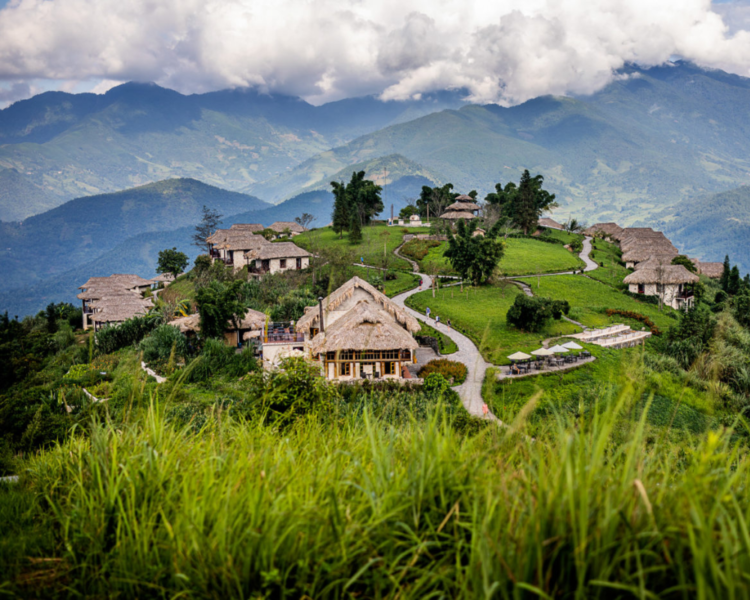
When it comes to dining choices, Sapa has plenty of options to satisfy any craving. Local restaurants serve dishes that feature fresh vegetables and meats sourced from nearby farms. Be sure to try thang co, a traditional soup made with horse meat and organs that are often served at breakfast time. Vegetarians will also find plenty of options here, including tofu dishes and stir-fried veggies.
As you explore the town’s culinary offerings, don’t forget to keep an eye out for cultural events and festivals happening during your visit. These celebrations provide an excellent opportunity to witness traditional dances and music performances while learning more about the local customs and traditions.
Sapa 1 Day Tours

- 1 day experience
- Moderate to challenging
- Cultural immersion & active adventure
- Rice fields, valleys & villages
- Private tours
- Vegan-friendly
Sapa 2 Day Tours

- 2 days 1 night experience
- Moderate to challenging
- Cultural immersion & active adventure
- Mountains, valleys, rice fields and villages
- Private tours
- Vegan-friendly
Sapa 3 Day Tours

- 3 days 2 night experience
- Moderate to challenging
- Cultural immersion & active adventure
- Mountains, valley, rice fields & villages
- Private tours
- Vegan-friendly
Sapa 4 Day Tours

- 4 days 3 night experience
- Moderate to challenging
- Cultural immersion & active adventure
- Mountains, valleys, rice fields & villages
- Private tours – Less Touristic
- Vegan-friendly
Cultural Events and Festivals
Don’t miss out on the cultural events and festivals in Sapa, where you can witness traditional dances and music performances while learning more about the local customs and traditions. The Hmong people, one of the ethnic groups living in Sapa, have their unique way of celebrating life events such as weddings and funerals through dance. You can see these dances during festivals like the Love Market Festival or the Bac Ha Horse Race Festival.
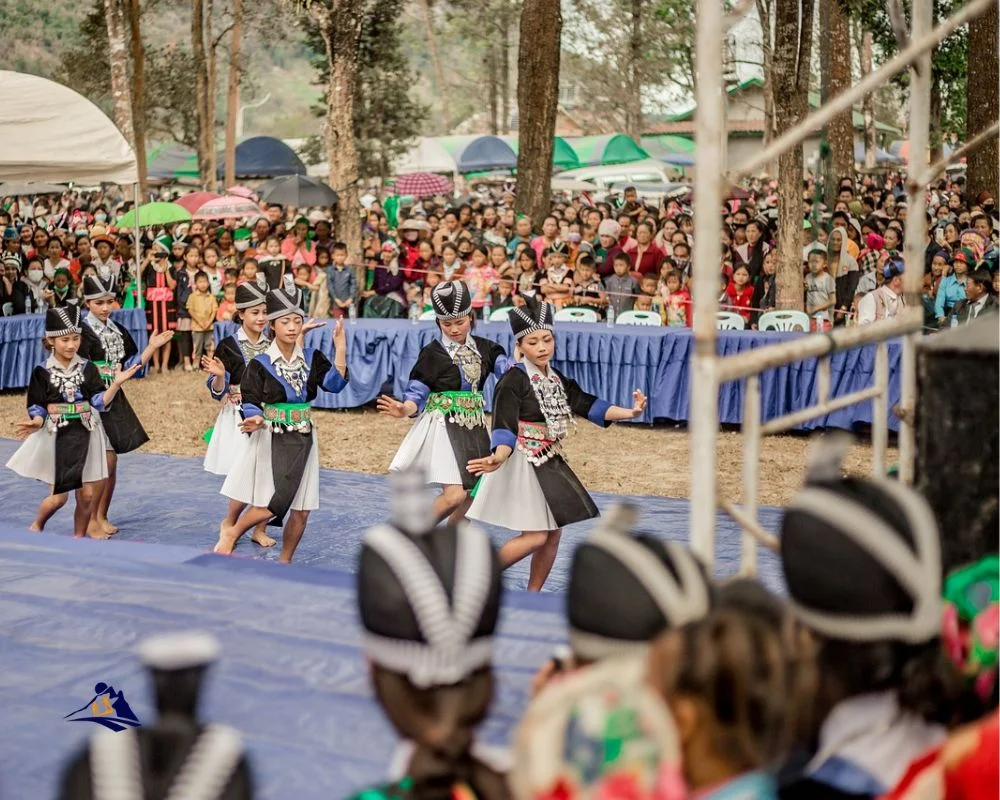
In addition to dance performances, there are also opportunities to learn about cultural traditions through hands-on experiences such as cooking classes where you can learn how to make local dishes like thang co (a soup made with horse meat) or banh cuon (steamed rice rolls). These cultural events not only provide entertainment but also a deeper understanding of the local customs that have been passed down through generations.
As you immerse yourself in these cultural activities, it’s important to remember responsible tourism and sustainable development practices. By supporting locally-owned businesses and respecting cultural traditions, we can ensure that future generations will be able to enjoy these unique experiences as well.
Responsible Tourism and Sustainable Development

It’s important to prioritize responsible tourism and sustainable development practices to preserve cultural traditions for future generations. When visiting the Sapa rice fields in January, it’s crucial to be aware of your impact on the environment and the local community. Here are three ways you can practice eco-friendly tourism during your visit:
- Support local businesses: Instead of staying at a large hotel chain, opt for a homestay with a local family or small guesthouse. This provides income directly to the community and allows for an authentic cultural experience.
- Reduce waste: Bring a reusable water bottle and shopping bag with you on your trip, and avoid single-use plastics as much as possible. You can also participate in organized clean-up events or pick up litter while hiking through the rice fields.
- Respect cultural traditions: Learn about the customs and beliefs of the Hmong people who live in the area, and make sure to ask permission before taking photos of them or their homes. By being respectful and mindful of these traditions, we can help preserve them for years to come while still enjoying all that this beautiful destination has to offer.
Sapa Rice Fields In January Frequently Asked Questions
What is the average yield of rice produced in the Sapa Rice Fields?
If you’re wondering about the average yield of rice produced in any rice fields, there are a few factors that play an important role. Rice cultivation techniques have evolved and can greatly impact the final yield. Farmers use different methods to prepare the soil, plant the seeds, and manage pests and diseases. Additionally, weather conditions also play a crucial role in determining rice yields. For example, too much or too little rain can negatively affect crop growth and development. InTochieve optimal yields, farmers need to carefully balance all these factors while adapting to changing weather patterns. Overall, successful rice cultivation requires knowledge, experience, and the ability to adapt quickly to changing conditions – no matter where you are growing your crops!
Are there any endangered or rare species that can be found in the Sapa Rice Fields?
As you explore the stunning natural beauty of the Sapa region, you may be surprised to discover that it’s not just the rice fields that are worth marveling at. The area is also home to some incredibly rare and endangered species that are being carefully protected through conservation efforts. From the majestic red panda to the elusive clouded leopard, there is no shortage of wildlife to spot in this breathtaking landscape. As you take in the sheer diversity of life around you, it becomes clear how important it is that we continue to prioritize conservation efforts to preserve these treasures for generations to come.
How has modern technology impacted the traditional farming practices in the Sapa Rice Fields?
The impact of mechanization on traditional farming practices has been both positive and negative. On the one hand, modern technology has made it easier to cultivate and harvest crops, increasing efficiency and productivity. However, this has also led to a loss of traditional knowledge and practices that have been passed down from generation to generation. It is important to strike a balance between utilizing modern technology and preserving traditional methods to ensure the sustainability of agriculture for future generations. While there may be a subconscious desire for freedom from manual labor, it is crucial to recognize the value of these time-honored practices in maintaining our connection with the land.
What is the economic significance of the Sapa Rice Fields to the local community?
If you’re curious about the economic significance of sustainable agriculture to local communities, look no further than the benefits it brings. Community Benefits are numerous and include food security, job creation, and preservation of cultural heritage. Sustainable agriculture practices like those employed in the Sapa rice fields ensure that farmers can continue to produce high-quality crops while preserving the environment for future generations. By utilizing traditional farming techniques alongside modern technology, farmers in these areas can maximize their yields without compromising sustainability. The result is a vibrant local economy that supports small businesses and promotes self-sufficiency. If you value freedom and independence, supporting sustainable agriculture initiatives like those found in the Sapa rice fields should be a top priority.
Are there any health risks associated with hiking in the Sapa Rice Fields?
When it comes to hiking in any outdoor environment, it’s important to be aware of potential hazards that may arise. The Sapa rice fields are no exception. You’ll want to watch out for uneven terrain, slippery surfaces due to mud or rain, and sharp rocks or plants that could cause injury. However, don’t let these risks deter you from the health benefits of hiking in this beautiful region. Hiking is a great way to boost your physical fitness and mental wellbeing. InStudiesave shown that spending time in nature can reduce stress levels and improve cognitive function. So strap on your hiking shoes and hit the trails – just be sure to stay alert and cautious along the way!
Conclusion
Congratulations on discovering the beauty of Sapa Rice Fields in January! You have learned about its location, history, culture, and the best ways to explore this breathtaking destination. Now that you are equipped with all the necessary information, it’s time to plan your trip.
Be sure to consider the climate and weather when packing for your journey. While there are accommodations and dining options available, you may want to attend cultural events and festivals during your stay. Remember to practice responsible tourism and sustainable development by being respectful of local customs and supporting eco-friendly initiatives.
By immersing yourself in this stunning landscape, you will undoubtedly create memories that will last a lifetime. So go ahead and book your trip today – the Sapa Rice Fields in January await!
Sapa 1 Day Tours

- 1 day experience
- Moderate to challenging
- Cultural immersion & active adventure
- Rice fields, valleys & villages
- Private tours
- Vegan-friendly
Sapa 2 Day Tours

- 2 days 1 night experience
- Moderate to challenging
- Cultural immersion & active adventure
- Mountains, valleys, rice fields and villages
- Private tours
- Vegan-friendly
Sapa 3 Day Tours

- 3 days 2 night experience
- Moderate to challenging
- Cultural immersion & active adventure
- Mountains, valley, rice fields & villages
- Private tours
- Vegan-friendly
Sapa 4 Day Tours

- 4 days 3 night experience
- Moderate to challenging
- Cultural immersion & active adventure
- Mountains, valleys, rice fields & villages
- Private tours – Less Touristic
- Vegan-friendly
